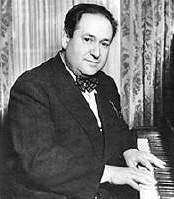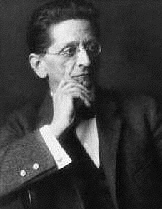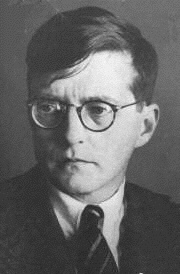
Zemlinsky, Korngold, and Shostakovich Yesterday evening Nikolai Znaider played Korngold's violin concerto (1945), with the London Philharmonic Orchestra conducted by Vladimir Jurowski. The concerto is drawn in part from the scores Korngold wrote for the film The Prince and the Pauper (1937), Juarez (1939), and the Oscar-winning score for Anthony Adverse (1936) - of course in those days the music for a film was effectively dead after its initial release, so re-using it wasn't such an odd decision as it would be nowadays. Despite its lush lyricism, the work makes considerable technical demands on the performer (it was originally written for the phenonemal Jascha Heifitz): Znaider surmounted these in fine style.  From
1908 to 1911 the young Korngold studied with the established operatic composer
Alexander von Zemlinsky (1871-1942), learning a
great deal from him. (When in 1911 Korngold went on to study with Hermann
Grädener, Zemlinsky sent him a postcard asking 'Is Grädener making any
progress?'). Korngold's romantic style, with complex orchestrations, owes a good
deal to Zemlinsky, and the concert started with Zemlinksy's Sinfonietta Op.23 -
a logical choice given the connection between the men. It's a late work - 1934 -
dealing in more dissonance than Zemlinsky's earlier romantic writing. From
1908 to 1911 the young Korngold studied with the established operatic composer
Alexander von Zemlinsky (1871-1942), learning a
great deal from him. (When in 1911 Korngold went on to study with Hermann
Grädener, Zemlinsky sent him a postcard asking 'Is Grädener making any
progress?'). Korngold's romantic style, with complex orchestrations, owes a good
deal to Zemlinsky, and the concert started with Zemlinksy's Sinfonietta Op.23 -
a logical choice given the connection between the men. It's a late work - 1934 -
dealing in more dissonance than Zemlinsky's earlier romantic writing.
 Both
Zemlinsky and Korngold managed to escape the Nazis and their condemnation of
'degenerate music'. Dmitri Shostakovich (1906-1975) had to function
in Stalin's Russia, when it was demanded that all music must be optimistic and
in the service of the State. After damaging critiscism of his opera Lady Macbeth of Mtsenk Shostakovich had to
give the appearance of complying with the State's demands. (Plenty of artists
and musician's who failed to do so were 'disappeared'.) His 6th Symphony,
composed in 1939, has three movements. The first, and longest, is uneasy and
slow; the second is a scherzo, but one with an edgy feel to it. The last
movement - taken by Jurowski at a cracking pace and played with almost
terrifying precision - sounds on the surface like rumbustious fun: but it is the
fixed smile of those in a totalitarian regime: look happy - or die. Both
Zemlinsky and Korngold managed to escape the Nazis and their condemnation of
'degenerate music'. Dmitri Shostakovich (1906-1975) had to function
in Stalin's Russia, when it was demanded that all music must be optimistic and
in the service of the State. After damaging critiscism of his opera Lady Macbeth of Mtsenk Shostakovich had to
give the appearance of complying with the State's demands. (Plenty of artists
and musician's who failed to do so were 'disappeared'.) His 6th Symphony,
composed in 1939, has three movements. The first, and longest, is uneasy and
slow; the second is a scherzo, but one with an edgy feel to it. The last
movement - taken by Jurowski at a cracking pace and played with almost
terrifying precision - sounds on the surface like rumbustious fun: but it is the
fixed smile of those in a totalitarian regime: look happy - or die.Posted: Thu - November 15, 2007 at 09:07 AM by Roger Wilmut |
Quick Links
About Me:
Roger Wilmut XML/RSS Feed
MY PODCAST
Archives
Calendar
Blogroll
WEBRINGS
Statistics
Total entries in this category: Published On: Mar 11, 2016 05:00 PM |
||||||||||||||||||


